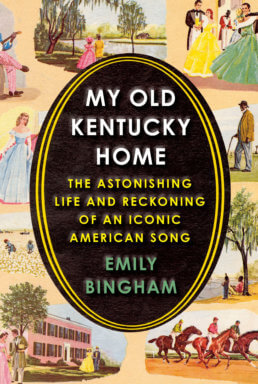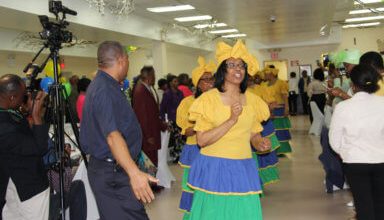Maybe hum a few bars?

“My Old Kentucky Home: The Astonishing Life and Reckoning of an Iconic American Song” by Emily Bingham
c.2022, Knopf
$30.00
329 pages
Raise your voice in song.
Let it carry to the skies, high notes above the clouds like so many birds in flight, low notes scraping the tips of the grass. Sing your happiness out loud, and let your sadness be carried softly to a better place. Raise your voice in song, even if, as in the new book “My Old Kentucky Home” by Emily Bingham, it sends someone else down.
Stephen Foster was in a bad way.
Unhappily married less than a year and father to a child he suspected wasn’t his, he struggled to do the right thing, by mid-1800s standards, and support his family. Foster owed his brother many hundreds of dollars for rent on a room, the debt was racking up, and he was miserably unhappy. He’d been working hard on the songs he was writing, but he was frustrated and embarrassed that the only interest anyone showed was for minstrel music. Minstrelsy, says Bingham, featured white people on-stage in cork-blackened faces, depicting Black people as “uncivilized, inane, emotional, crude, overly sexual, but also ‘naturally’ musical and athletic.”
For a songwriter, she says, minstrelsy “smelled the worst.”
It was a living, but not the one Foster wanted. His marriage in shreds, his wife gone, he moved into what was basically a closet, where he died of alcoholism.

By that time, though, audiences at minstrel shows had come to love a song about which Foster had “thought better of what he’d done,” and had re-worked. Gone was its offensive title and the fake “Negro” dialect. The song was called “My Old Kentucky Home, Good Night.”
Still, it was racist, says Bingham, but Frederick Douglass called it “our national music,” and so it stayed a part of our musical heritage. Post-Civil-War Black performers included it in their acts, much as they disliked the song. “In the first decades of the [last] century,” says Bingham, the song “became a newly beloved hymn…” Later, even Eleanor Roosevelt expressed her appreciation for it. And it was sung at the Kentucky Derby this year, albeit with several important edits…
Pick up “My Old Kentucky Home” and it says right there on the cover that this is a story of “an Iconic American Song.” But it’s so much more than that. This is a biography of racism through music.
In her introduction, author Emily Bingham tells how, as a young girl, she came to the sudden realization that the song she loved was full of words she didn’t. This kind of relativity runs through the book, gluing together the story of the song while also explaining that its lyrics and meanings through the years were signs of the various times. This doesn’t mean Bingham waves away the problematic issue of the song itself; rather, she cleaves it to national issues of post-Reconstruction, Jim Crow, Civil Rights, and modern times on a razor’s edge of forgiveness and outrage.
Musicologists will enjoy this book, as will historians who also love music. Surely, “My Old Kentucky Home” will raise good conversations.





